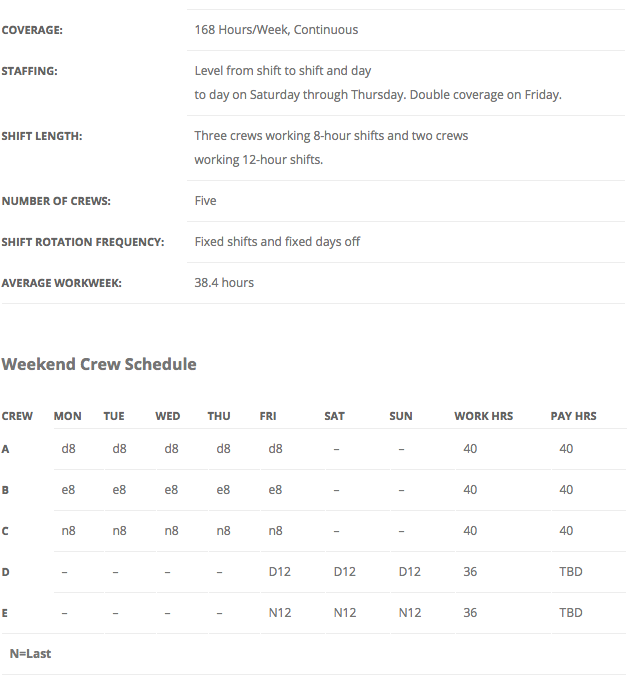Some industries, like oil refining, power generation, law enforcement, and health care providers have used continuous, 24/7 schedules almost from the day they were established. Since these organizations cannot function properly without continuous coverage, they start with a shift schedule that is designed to meet their 24/7 requirements.
Most other industries, such as manufacturing and customer support services, have evolved with increased coverage demand – often starting with one shift and then moving to two and then three shift coverage, Monday through Friday. The final step in this evolution is to a continuous schedule.
The schedule change strategy up to this point has been to minimize the change required by the current workforce. While this change strategy may not yield the optimum shift schedules for an organization as it grows, it certainly is “safe” from a human relations perspective. However, when a company needs to move from 5-day operations to 7-day operations, this strategy can result in significant human relations and operational problems.
Companies using this “safe” strategy conclude that the logical path for a company to move from 5-day coverage to 7-day coverage is to keep all current employees on their Monday through Friday schedule; then hire new employees onto a weekend crew that provides the weekend coverage. In fact, almost every week we talk with companies that have considered moving from 5-day coverage to 7-day coverage by using a weekend crew.
The schedule below demonstrates one weekend crew schedule. We think it is important to realize that there are many other possible schedules, but this schedule is simple, and clearly demonstrates the advantages and disadvantages of Weekend Crew Schedules.
Shift Schedule Parameters

This schedule uses five crews to provide continuous coverage. Monday through Friday is covered with three crews working fixed shifts (day shift, evening shift, or night shift). Friday through Sunday is covered with two crews working 12-hour shifts (day or night shift). This coverage results in Friday being covered with double the required staffing for 24 hours.
Schedule Advantages
- Clearly, this schedule will work for the current workforce at least as well as the 5-day schedule. In fact, it may even work better since excessive weekend overtime is eliminated, Fridays are now available to take vacation days, and discretionary work (like cleaning, training, and meetings) can be conducted on Fridays when extra staffing is available. This meets the strategy of minimizing the change required by the current workforce.
- The weekend crew schedule is perfect for employees pursuing a full-time education or working another part-time or full-time job. While these are often excellent employees, their weekend job is often a lower priority than their weekday obligations. Students also tend to move on after graduation, increasing turnover rates and training costs.
- Pay policies are often designed to pay 40 hours of pay for 36 hours of work. While this is expensive, it does attract some people to the weekend schedule.
Schedule Disadvantages
- Overstaffing on Friday is extremely expensive. It is the equivalent of staffing for eight days of coverage when only seven days are required (i.e. 14% more than required). While some of this time may be used effectively for training and absence coverage, most companies cannot use 14% more coverage – particularly if it is concentrated on only one or two days. This mismatch in staffing results in millions of dollars in unnecessary labor costs.
- The common practice of paying 40 hours pay for 36 hours of work increases overall labor costs/unit of weekend production by 11%.
- New personnel are recruited into the weekend night shift schedule. This can be a major recruiting handicap.
- Personnel that do agree to work every weekend night just to get their foot in the door at a good company often change their thinking after the have worked a year or more of weekends. This results in increased turnover and absenteeism.
- Weekend crews usually have less experience than their weekday counterparts, resulting in fewer skills on-shift. This lower skill level is matched to a drastically reduced support system from outside organizations and management.
- Weekend crews can become a lower class that takes the blame for poor production performance. This frustrates the entire workforce and lowers morale.
- Weekend crews tend to conduct business differently than their weekday counterparts. Many times we have seen weekday/weekend operations that function like different companies – both with different management and operational philosophies and policies that deviate from the best practices for running the business.
The bottom line on a Weekend Crew Schedules is that they are expensive and difficult to manage relative to a properly designed and implemented seven-day schedule designed for the task. They should be avoided unless there is no other alternative for meeting your coverage requirements.
Shiftwork Solutions can help you evaluate your need for a seven-day schedule. If you need one, we can help you implement the right one.
Call Us and We Can Help
Call or text us today at (415) 763-5005 to discuss your operations and how we can help you solve your shift work problems. You can also complete our contact form and we will call you.

